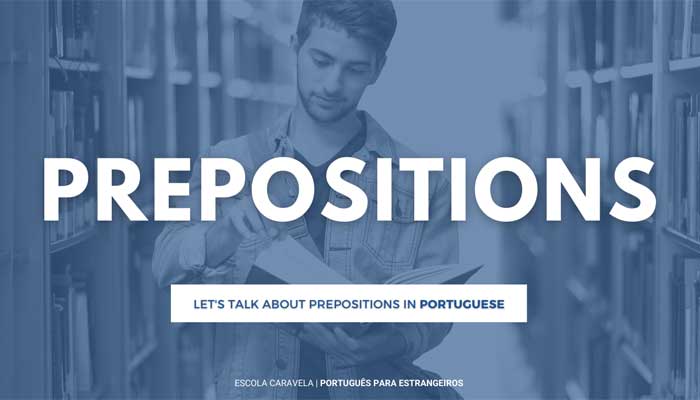In this article, we will talk about prepositions used in Portuguese language, how and in which context we use them.
Introduction
Portuguese learners commonly have doubts and make mistakes, even advanced students. This difficulty is due to the fact that most of the time, the prepositions cannot be translated literally without focus on the construction and meaning of the entire phrase. Also, many phrases require a preposition in Portuguese that is different to that used in English, for example.
What is a Preposition?
Firstly, prepositions are little words that connect one word to another in a sentence. They show how the noun relates to another element in the sentence usually in terms of time, location, movement, or in other contexts. The group of prepositions is composed by single-words prepositions like in, on, to, at, from, of, or by or a group of words like in front of, in top or in the middle. As in English, all the prepositions come before the noun in Portuguese and follow a verb.
In this article, we will focus on the common simple prepositions. Here are some examples:
| Portuguese | English |
| Em | In, on, at |
| De | From, of, by |
| A | To, at |
| Por | Through, for |
| Para | for |
Most of the time, these prepositions are used with a definite or indefinite articles and a contraction is required, agreeing in gender and number with the noun they refer to. Let´s see the contractions between prepositions and articles:
| Contraction with definite articles: o, a, os, as (the) | Contraction with indefinite articles: um, uma, uns, umas (a) |
| EM: no, na, nos, nas
A: ao, à, aos, às DE: do, da, dos, das POR: pelo, pela, pelos, pelas |
EM: num, numa, nuns, numas
A: – DE: dum, duma, duns, dumas POR: – |
Prepositions of Location
The following prepositions are common in expressing location:
A – at: the preposition A generally carries the meaning TO. It also means AT in certain sentences:
Todos os convidados estão sentados à mesa. (All the guests are sitting at the table).
A minha mãe está à janela. (My mother is at the window).
Em – in/on/at: This preposition indicates places/locations:
Estou em Lisboa. (I’m in Lisbon)
Estamos na praia. (We are at the beach)
As chaves estão na mesa. (The keys are on the table)
Prepositions of Direction/ Movement
The prepositions of movement are used to indicate the direction, place, transport.
A – to: frequently indicates direction for a short time.
Vou ao cinema. (I go to the cinema)
Vamos à Alemanha este fim de semana. (I will go to Germany this weekend)
De – from: Indicates the origin of the movement or the transport.
Venho de França. (I come from France)
Saímos de casa cedo. (We left the house early)
Vou de autocarro para o trabalho. (I go by bus to work) (transport used)
Para – for/to: frequently indicates a target or objective of a movement for a long time or a direction in space.
Vou para os estados Unidos trabalhar. (I will go to the USA to work) (long time)
Este avião vai para o México. (This plane goes to Mexico) ( direction )
Por – through: this preposition indicates an itinerary.
Esta manhã, passei por Lisboa. (I passed though Lisbon this morning)
Todos os dias passo pelo parque. (Every day, I pass through the park)
Prepositions of Time
The prepositions of time are used to indicate the time: hours, months, years, days of the week, …
Em – in: Usually used to indicate the months, the years, a specific day of the week.
Nasci em 1975. (I was born in 1975)
Estamos em setembro. (We are in September)
Ele vai chegar no sábado. (He will arrive on Saturday) (specific day)
A – at/ in: this preposition is used to indicate the hours, parts of day (à tarde/ à noite), repetitive events (habits).
Levanto-me às 8.00 todos os dias. (I wake up at 8.00 a.m every day) (hours)
O filme começa às 22.00. (The movie starts at 10.00 p.m.)
Vejo sempre televisão à noite. (I always watch TV in the evening)
Vou sempre jantar fora ao sábado. (I always dine out on Saturday) (repetive event/ habit)
De – in: indicates parts of the day (de manhã), used with dates.
Tomo duche de manhã. (I take a shower in the morning) (part of the day)
Nasci a 11 de janeiro de 1975. (I was born in 11th of January of 1975) (date)
Para – For/ next: used in the context of the time, this preposition indicates a temporal location in the future.
Vou marcar cabeleireiro para as 10.00 da manhã. (I will make an appointment to the hairdresser for 10.00 am)
Para a semana vou a Paris. (Next week I will go to Paris)
Por – for/ per/ a/ around: this preposition is used to express frequency, approximate time or duration.
Ele tem aulas de português duas vezes por semana.
(He has Portuguese lessons twice a week) (temporal distribution/ frequency).
Eu trabalho oito horas por dia. (I work eight hours per day) (temporal distribution/ frequency).
Ele chega a Lisboa pelas 14h. (He will arrive at Lisbon around 02.00 p.m.) (approximate time)
Eles vão ficar em Portugal por duas semanas. (They will stay in Portugal for two weeks).
Conclusion
In this article we’ve tried to came up with some common cases when we use the most frequent and basic prepositions. In order to assimilate all this information is necessary practice, hear and read. However, we believe if you understand and feel these differences between them, it will help you in your daily life.
Finally, you probably know that for deeper practice and learn we can join to one of our schools.
Até breve!
